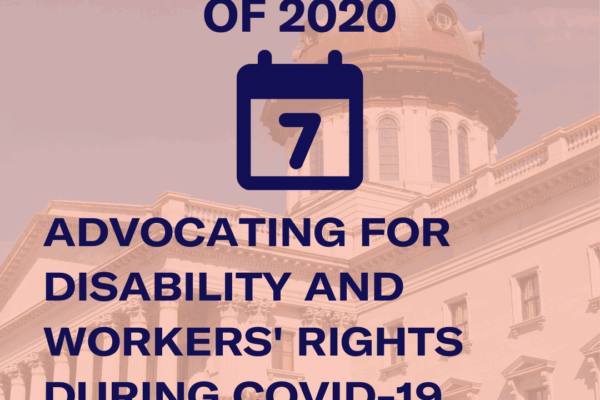The past year has brought multiple crises – from the continued murder of Black people by law enforcement, to the direct and collateral harms of COVID-19, to systematic efforts to restrict the fundamental right to vote, and more.
Thanks to ACLU supporters like you, we stood ready to face these crises – and we are ready for whatever comes next.
For the rest of this month, we invite you to tune in as we share some of our accomplishments from the past year. While we achieved many successes in 2020, much work remains before we can consider South Carolina a state where We the People means everyone. Thank you for being part of this work.
Read more about this work:
Advocating for Disability and Workers’ Rights
The COVID-19 pandemic has laid bare our society’s failure to protect people who are already vulnerable as a result of pervasive injustices. Across the nation, nursing homes with predominantly Black and Latinx residents are twice as likely to suffer the impacts of COVID-19 as those with predominantly white populations.
That’s why we, along with our partners at AARP South Carolina, Able South Carolina, Protection and Advocacy for People with Disabilities, Inc., Women’s Rights and Empowerment Network, and the YWCA of Greater Charleston, sent a letter to Governor McMaster urging him to safeguard the health of all people in South Carolina and prioritize those who are most at risk.
Specifically, we asked Governor McMaster to:
- Prioritize and expand Home and Community Based Services (HCBS);
- Reduce the number of people confined in congregate facilities;
- Create a South Carolina Olmstead plan that includes a strong commitment to affording people with disabilities opportunities to secure accessible and affordable housing, transportation, and fully integrated employment;
- Support advocacy organizations’ mandated access and community integration efforts;
- Support family members providing care;
- Expand data collection and transparency around congregate settings;
- Provide additional support for on-site monitoring for abuse and neglect;
- Provide personal protective equipment for direct service professionals providing HCBS and workers in congregate facilities;
- Provide paid leave to workers in all settings; and
- Increase worker pay and provide alternative housing to workers.
Reports indicate that more than 72,000 nursing home and long-term care institution residents and workers have died as a result of COVID-19, accounting for more than 35 percent of all pandemic-related deaths in the United States. As of October, South Carolina has seen nearly 1,400 deaths among residents and staff of long-term care facilities since April 3, representing about 40 percent of deaths overall in the state.
Across the nation, nursing homes with predominantly Black and Latinx residents were determined to be twice as likely to suffer the impacts of COVID-19 as those with predominantly white populations. South Carolina data reflects these racial disparities, as of October Black people accounted for nearly 44 percent of hospitalizations and 35 percent of reported COVID-19 deaths while making up about a quarter of the state’s population.
In addition to recommendations for protecting residents of congregate facilities, the letter elevates an imperative to meet the needs of people in the congregate care workforce. In South Carolina, sixty-four percent of the nearly 50,000 direct care workers are Black, and 93 percent are women. Recent data reflect South Carolina direct care workers’ median annual earnings were less than $16,000, and 44 percent relied on some type of public assistance.
In coalition with our partners, we continue to advocate for the implementation of these recommendations.

